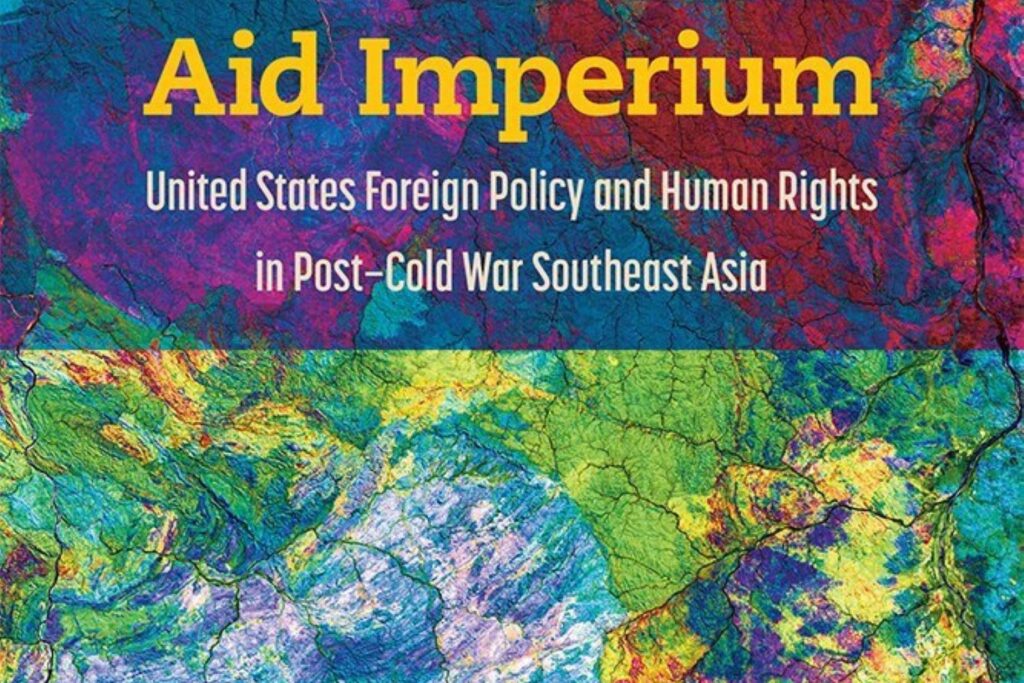Review of: Aid imperium: United States Foreign Policy and Human Rights in Post-Cold War Southeast Asia by Salvador Santino F. Regilme Jr. University of Michigan Press, 2021.
How does foreign aid affect recipient nations’ human rights conditions? What determines whether foreign aid will strengthen or undermine civil liberties? In his book Aid imperium: United States Foreign Policy and Human Rights in Post-Cold War Southeast Asia, Salvador Santino F. Regilme Jr. breaks new ground in his attempt to answer these questions. Regilme argues that the primary factors that determine how foreign aid will affect its recipient’s human rights situation are the donor country’s policy priorities. If the donor country’s aid policy does not prioritize human rights, he argues, then foreign aid (or as he calls it, foreign strategic support) undermines human rights in recipient countries, particularly physical integrity rights—the freedom of the human person from extrajudicial killings, enforced disappearances, physical harassment, and torture. Regilme writes that:
“the donor and recipient governments’ converging interests, together with the domestic legitimacy of the recipient government, primarily shape the purposes of foreign aid programs and domestic policies.”
Drawing on case studies of the Philippines and Thailand, Regilme shows how the downturn in both countries’ human rights records from the 1990s to the 2000s can be partly attributed to a change in the focus of US foreign aid from economic development in the 1990s to anti-terrorism in the 2000s. Regilme convincingly argues that while domestic political factors primarily drove the policies that degraded human rights in the Philippines and Thailand, US aid gave these states the means to implement these policies on a much larger scale and enabled them to cause greater harm to their respective populations.
The chapters on the Philippines are divided into distinct periods in US-Philippines relations. The first of these chapters examines the 1990s, when then-Filipino President Fidel Ramos led a democratic Philippines after decades of authoritarian rule and then-US President Bill Clinton sought to establish the United States’ role as an arbiter of human rights in a post-Cold War world. Since both leaders wanted to burnish the human rights credentials of their respective governments, and US foreign aid policy was shaped accordingly, US financial assistance to the Philippines helped improve human rights conditions there. The following chapter details how US-Philippines relations changed in the 2000s. In the Philippines, then-President Gloria Arroyo struggled with domestic political legitimacy and the George W. Bush administration was focused on waging the global war on terrorism. Here, the interests of both governments converged to the detriment of the aid recipients’ human rights record. Arroyo linked local rebellions in the Philippines to the wider war on terrorism in her appeals for foreign aid. Thus, US foreign strategic support allowed Arroyo to enhance her crackdown on both rebels and political opponents.
The chapters covering the human rights implications of US aid to Thailand tell a similar story. In the 1990s, Regilme argues that the Clinton administration’s aid policies led to improvements in Thailand’s human rights conditions after the country’s return to democracy in 1992. As with the Philippines case study, the 2000s saw the Bush administration prioritize counter-terrorism over human rights in foreign aid distribution, and Regilme persuasively demonstrates the influence of this US policy shift on the deterioration of Thailand’s civil liberties.
Overall, the presentation of Regilme’s case studies makes his narrative thread easy to follow, as he clearly distinguishes the policies of each US administration and their effects on the Philippines and Thailand. Regilme clearly demonstrates the link between the domestic human rights policies of the recipient countries and US foreign policy priorities. Regilme’s integrative approach in the investigation also lends the work extra depth and acknowledges the importance of both rhetoric and material factors when creating foreign aid policies. In the cases of both the Philippines and Thailand, then, Regilme’s argument stands up to scrutiny and provides invaluable insights into how US aid helped shape the domestic political situation of these countries.
The book’s two main weaknesses are its organizational structure and the limited range of its case studies. Dividing each of the two case studies into separate chapters for each US administration covered results in a significant amount of repetition, as the background context for each chapter overlaps considerably. Also, as an advancement of a new theory, the book’s chief deficiency is that its findings are limited to two countries. The addition of further case studies of countries outside the region would have bolstered the book’s central claims and given them wider relevance. Regilme addresses this limitation in his conclusion and suggests that future researchers build on his findings in more countries, especially those outside of Southeast Asia. This book, however, misses the opportunity to demonstrate its theory’s applicability beyond the Philippines and Thailand.
Nevertheless, Regilme presents a coherent and credible theory of the effect of foreign aid on recipient nations’ human rights conditions, and it serves as a great starting point for further theoretical development. If built upon in the future (either by Regilme himself or other researchers), Aid imperium could set the stage for a new school of thought within the literature on foreign aid.




